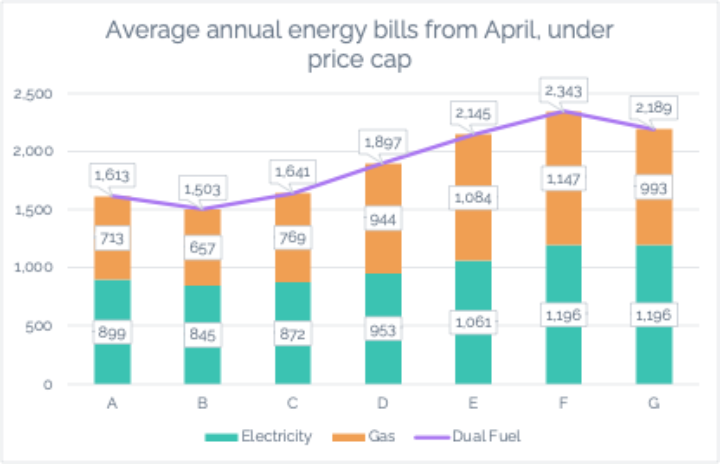Families in poorly insulated homes could pay £700 more on energy bills from April
Privately rented homes leak most heat with renters receiving benefits more likely to be in the most expensive homes to heat.

By Jess Ralston
info@eciu.netShare
Last updated:
From April, people living in homes with an Energy Performance Certificate (EPC) rating of band F could see average annual dual fuel energy bills of around £2,340 under Ofgem’s energy price cap, which is around £700 more than those living in an EPC band C home, the Government’s target [1].
From April, people living in homes with an Energy Performance Certificate (EPC) rating of band F could see average annual dual fuel energy bills of around £2,340 under Ofgem’s energy price cap, which is around £700 more than those living in an EPC band C home, the Government’s target [1].
Those living in EPC band D homes, the UK’s most common rating, could see bills that are around £250 higher than those living in EPC band C.
The least energy efficient homes are in the private rented sector, with 1 in 2 homes (52%) falling below the Government’s target of EPC band C, compared to less than a third (28%) of socially rented homes [2].
Government data shows private renters receiving housing benefit are more likely to live in the most expensive to heat buildings: around two-thirds (65%) of private renters in receipt of housing support live in homes rated EPC band D or below, compared to around half (49%) of those not in receipt of housing support [3].
They are also more likely to live in a building with damp, as around 1 in 7 (15%) private renters in receipt of housing support have a damp problem. This is compared to fewer than 1 in 10 private renters who do not receive housing support (8%) and even fewer (6%) social renters that receive housing support [4].
In addition, 25% of those receiving housing support reported they could not keep their home warm compared to 16% not receiving it [5].
Commenting on the analysis, Jess Ralston, Head of Energy at the Energy and Climate Intelligence Unit, said: “The last government promised to introduce and then delayed new minimum standards for landlords so that properties didn’t cost the earth to heat, and this government has pushed them back again to 2030. Those receiving housing benefit for their privately rented home could have been hundreds of pounds better off a year if these standards had come into force, or at least they could have afforded the heating rather than turning it off to make ends meet.
“Private landlords could have been required to invest up to a few thousand pounds in getting their properties insulated, boosting jobs and lifting households out of fuel poverty. Instead, this lack of investment leaves many in more need of financial support and the UK more dependent on gas imports as heat from boilers simply leaks out of homes.”

Around 60% of properties with cavity walls in the private rented sector have insulation, compared to around 80% in social rented sector. For solid walled properties, this is less than 10% for the private rented sector compared to around 25% for socially rented sector [6].
Notes to editors:
1. ECIU analysis uses prices under Ofgem’s price cap for Q2 2025 and applies these prices to a whole year’s demand at Typical Domestic Consumption Values (TDCV) and for median demand at different EPC bands, according to the DESNZ National Energy Efficiency Database. Analysis based on prices for Q2 is illustrative of costs for the year, on the assumption of prices not varying much in the three other price caps over the coming 12months.
2. English Housing Survey 2023-24: https://www.gov.uk/government/statistics/annex-tables-for-english-housing-survey-2023-to-2024-headline-findings-on-housing-quality-and-energy-efficiency
3. English Housing Survey 2022-23 (latest available data): https://www.gov.uk/government/statistics/english-housing-survey-2022-to-2023-rented-sectors/english-housing-survey-2022-to-2023-rented-sectors
4. English Housing Survey 2022-23 (latest available data): https://www.gov.uk/government/statistics/english-housing-survey-2022-to-2023-rented-sectors/english-housing-survey-2022-to-2023-rented-sectors
5. English Housing Survey 2022-23 (latest available data): https://www.gov.uk/government/statistics/english-housing-survey-2022-to-2023-rented-sectors/english-housing-survey-2022-to-2023-rented-sectors
6. English Housing Survey 2023-24: https://www.gov.uk/government/statistics/annex-tables-for-english-housing-survey-2023-to-2024-headline-findings-on-housing-quality-and-energy-efficiency
For more information or for interview requests:
George Smeeton, Head of Communications, ECIU, Tel: 07894 571 153, email: george.smeeton@eciu.net